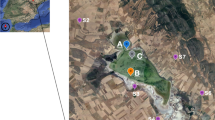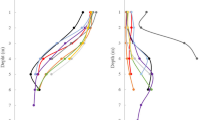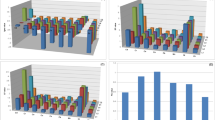Abstract
AN article by Beauchamp1 suggests that a sulphur shortage in Lake Victoria is a factor limiting the growth-rate of fish. Owing to the fact that sulphates are removed from the water by biological precipitation in the form of plant and animal remains, Beauchamp suggests that the sulphate ultimately becomes anaerobically reduced to insoluble and unavailable sulphides which accumulate in the mud of the lake bed. Thus, although the water is deficient in sulphur, the element may well be present in large quantities at the bottom of the lake. In order to obtain facts as to the distribution of sulphur in the water, mud and vegetation of Lake Victoria, a preliminary investigation has been undertaken in the small, northern area around Jinja.
This is a preview of subscription content, access via your institution
Access options
Subscribe to this journal
Receive 51 print issues and online access
$199.00 per year
only $3.90 per issue
Buy this article
- Purchase on Springer Link
- Instant access to full article PDF
Prices may be subject to local taxes which are calculated during checkout
Similar content being viewed by others
References
Beauchamp, R. S. A., Nature, 171, 769 (1953).
Koyama, T., and Sugarawa, K., J. Earth Sci., 1, 24 (1953).
Mortimer, C. H., J. Ecol., 29, 324 (1941).
Author information
Authors and Affiliations
Rights and permissions
About this article
Cite this article
HESSE, P. Sulphate Deficiency of Lake Victoria. Nature 177, 389–390 (1956). https://doi.org/10.1038/177389b0
Issue Date:
DOI: https://doi.org/10.1038/177389b0
This article is cited by
-
The distribution of sulphur in the mud of Lake Victoria
Plant and Soil (1970)
-
The distribution of sulphur in the muds, water and vegetation of Lake Victoria
Hydrobiologia (1957)
Comments
By submitting a comment you agree to abide by our Terms and Community Guidelines. If you find something abusive or that does not comply with our terms or guidelines please flag it as inappropriate.



